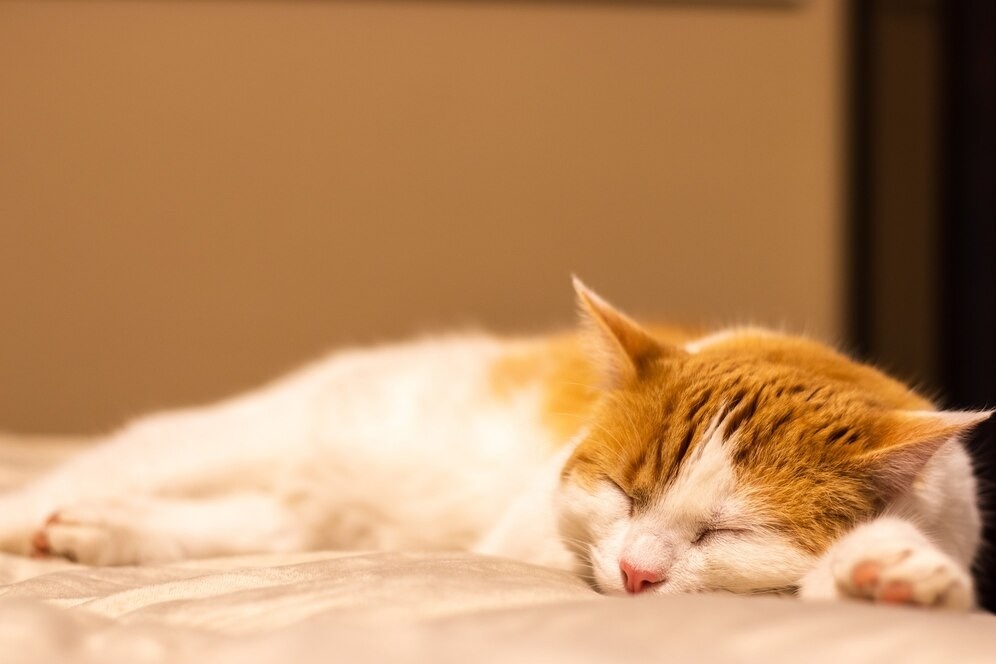Cats are known for their love of sleep. In fact, they sleep for most of the day! However, cats tend to be most active at night, which can cause problems if you’re trying to get some rest. Many cat owners wonder how to make a cat sleep at night so that both human and feline can have peaceful sleep.
If your cat’s late-night zoomies are keeping you awake, don’t worry! With a few simple changes, you can help adjust your cat’s sleep schedule and encourage them to rest when you do.

How Do Cats Sleep?
Cats sleep differently than humans. While we tend to have long, deep periods of sleep, cats usually sleep lightly and for shorter periods. This comes from their wild ancestors, who needed to stay alert to catch prey or avoid danger.
How cats sleep:
There are two main stages in a cat’s sleep: light sleep and deep sleep. During light sleep, your cat is alert and can wake up easily. They might doze with their eyes half open, ready to jump into action if needed. In deep sleep, cats may dream, and you’ll often see their paws twitch or whiskers move. This deeper stage is when they get the most rest.
On average, a cat sleeps for 12 to 16 hours a day. Kittens and older cats may sleep even more. However, most of this sleep happens in short bursts throughout the day and night. Knowing this helps when trying to figure out how to make your cat sleep at night.
Why Does My Cat Stay Up at Night?
Cats are naturally crepuscular, meaning they are most active at dawn and dusk. In the wild, this is when they would hunt. Domestic cats don’t need to hunt, but the instincts remain. That’s why you might find your cat zooming around the house just as you’re trying to sleep.
But there are ways to help make a cat sleep at night. Let’s go over some practical tips to help your cat (and you) get a better night’s sleep.
How to Make a Cat Sleep at Night
Many cat owners ask, “How can I make my cat sleep through the night?” Here are some effective tips that can help:
1. Play with Your Cat Before Bed
Cats are hunters by nature, so they need to burn off energy. If your cat has been lounging around all day, they’ll likely have a lot of energy at night. To help make your cat sleep at night, try playing with them about 30 minutes before bedtime. Use toys that mimic prey, like feathers on a string or laser pointers, to get them moving.
Interactive play sessions are great because they mimic the “hunt-eat-sleep” cycle. After an intense play session, your cat will likely feel tired and more willing to rest.
2. Give Your Cat a Late Meal
Cats often like to sleep after eating a meal. This is because, in the wild, a full stomach signals it’s time to rest after hunting and eating. If you feed your cat early in the evening, they may wake up in the middle of the night looking for food or attention. Try giving your cat their last meal right before you go to bed. A full belly can help make your cat sleep more soundly through the night.
3. Create a Relaxing Environment
Cats are creatures of comfort. To help make your cat sleep at night, ensure their sleeping space is quiet, cozy, and comfortable. You can use a soft blanket, a heated cat bed, or a quiet corner in your home where your cat feels safe.
If you want your cat to sleep with you in your bed, make your bedroom cat-friendly. Consider placing a blanket or cat bed at the foot of your bed so your cat has their own space. Some cats like to cuddle with their owners, while others prefer a little distance. By providing options, you can make your cat feel more comfortable.
4. Stick to a Routine
Cats are creatures of habit, and they thrive on routine. Try to keep your cat’s feeding and play schedule consistent. If your cat knows when to expect meals and playtime, they will be more likely to settle down when it’s time to sleep.
Establishing a nighttime routine can also help signal to your cat that it’s time to wind down. For example, you might play with your cat, feed them, and then dim the lights to create a calming atmosphere.
5. Consider Calming Aids
Sometimes, cats have trouble sleeping due to anxiety or overstimulation. If your cat seems restless or anxious at night, you could try using calming aids. These could include pheromone diffusers, calming sprays, or even catnip. Pheromone diffusers mimic the natural scent that cats use to mark their territory, making them feel more secure. Catnip, on the other hand, can make some cats more relaxed after their initial burst of excitement.
How to Make Your Cat Sleep With You
If you want your cat to sleep in bed with you, you’ll need to encourage them to see your bed as a safe and comfortable space. Here’s how to make your cat sleep with you:
1. Provide a Cozy Spot
Cats love warmth, so placing a soft blanket or bed near where you sleep can encourage your cat to stay close. If you want your cat to sleep with you, you could also try giving them treats or gentle pets while they’re on the bed, so they associate it with positive experiences.
2. Don’t Force It
While it can be sweet to have your cat sleep with you, don’t force them. Cats are independent creatures, and they may not always want to cuddle. Allow them to come and go as they please, and they may eventually choose to stay longer on their own.
3. Respect Their Boundaries
Some cats enjoy sleeping near their owners but not necessarily on them. Respect your cat’s boundaries and let them choose where they want to rest. The more comfortable they feel, the more likely they’ll want to sleep near you.
How to Make a Cat Sleep Instantly
While it’s not possible to make a cat fall asleep instantly, you can create an environment that encourages quick relaxation. Here are a few things you can try:
1. Soothing Sounds
Playing soft, calming music or nature sounds can help soothe your cat into a relaxed state. Some cats respond well to white noise or gentle classical music, which can create a peaceful atmosphere for sleep.
2. Use Calming Scents
Some cats are sensitive to certain scents. Lavender, chamomile, and valerian are known to have calming effects on cats. You can use a diffuser with cat-safe essential oils to create a relaxing environment.
3. Limit Overstimulation
If your cat is overstimulated, it will be harder for them to settle down. Keep nighttime activities calm and quiet. Avoid playing rough games with your cat or introducing new environments right before bed.
FAQ
Why is my cat so active at night?
Cats are naturally crepuscular, meaning they are most active at dawn and dusk. Their hunting instincts make them energetic during these times. To reduce nighttime activity, provide play and stimulation during the day.
Can I train my cat to sleep at night?
Yes, you can help adjust your cat’s sleep schedule by playing with them before bed, providing a late meal, and sticking to a consistent routine. These steps can make your cat more likely to rest at night.
Is it safe for my cat to sleep in bed with me?
Yes, it is generally safe for your cat to sleep with you if both of you are comfortable. Ensure your cat is healthy and free of fleas or ticks, and provide a cozy spot on the bed.
How do I stop my cat from waking me up at night?
To prevent your cat from waking you, try to tire them out with play before bedtime, offer a late meal, and establish a regular sleep routine. Avoid feeding or engaging with them if they wake you.
What if my cat doesn’t want to sleep with me?
Cats are independent creatures, and some may prefer sleeping in their own space. Provide cozy areas throughout your home, and let your cat decide where they feel most comfortable sleeping.
Conclusion
Helping your cat sleep through the night doesn’t have to be a challenge. With the right routine, play, and a cozy sleeping environment, you can encourage your cat to rest at night and enjoy more peaceful sleep yourself. By learning how to make a cat sleep and adjusting their schedule to match yours, both you and your feline friend will benefit from restful nights. For more cat care tips, check out other helpful articles at Cattoptips!
Now, both you and your cat can enjoy sweet dreams.


